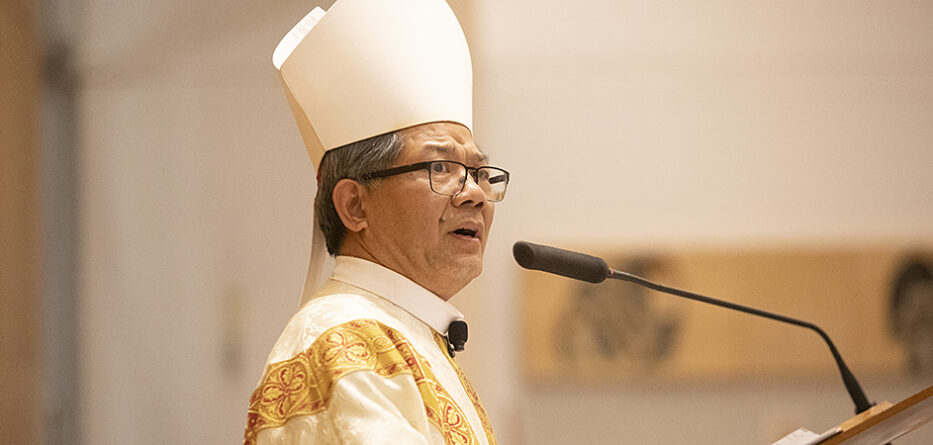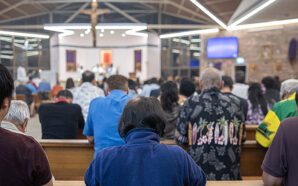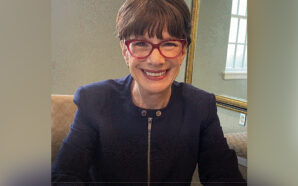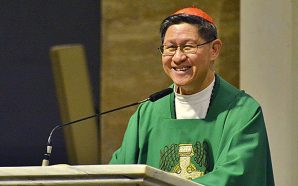Most Reverend Vincent Long Van Nguyen OFM Conv DD STL, Bishop of Parramatta
Homily for the Second Sunday of Easter (Divine Mercy Sunday), Year B
Readings: Acts 4:32-35; Psalm 117(118):2-4, 15-18, 22-24; 1 John 5:1-6; John 20:19-31
7 April 2024
Faith that integrates doubts and expresses in service
Sisters and brothers,
We have all experienced scepticism, doubt, uncertainty, confusion and perplexity. In times of extreme difficulty, such as the unexpected diagnosis of terminal cancer or the sudden death of a loved one, we are often assailed by these emotions. We struggle to make sense of life through the prism of our Christian faith.
But doubt, despair and struggle are not necessarily absent from a healthy spiritual life. In fact, people of great faith will tell us that they often suffer from these crises. St Mother Teresa, for instance, wrote these words, “Darkness is such that I really do not see – neither with my mind nor with my reason. The place of God in my soul is blank. There is no God in me.” This admission by one of the most spiritual persons seems shocking to us. Yet the ability to live inside a question, to incubate the pain of not knowing and to dwell with the mystery is indeed indispensable for spiritual growth and maturity. The mystics of the Church such as Benedict, Meister Eckart, John of the Cross, Julian of Norwich, Teresa of Ávila did not eliminate doubts and questions but integrated them into their faith life.
Scriptures on the Second Sunday of Easter invite us to grow to higher levels of interiority and maturity. Faith at its deepest level is not synonymous with tangible security, control and problem-solving. Rather, it is a journey of vulnerable trust. It flourishes not in certainty but in questions. Growth germinates not in tent dwelling but in upheaval, not in withdrawing to safe harbour but venturing out into the deep.
We are inspired by the early Christian community, who shows us the way out of the darkness of despair and disillusionment in the wake of the crucifixion. In fact, right throughout the Easter season, the scriptures focus our attention on the fledgling Church and how it transforms itself into a shining instrument of the Gospel.
In today’s episode, the early Christians embraced a radically different value system. Instead of the “grab-all-you-can” mentality of the empire, they adopted a counter-cultural mindset. They shared their possessions and made sure that no one was left behind. They formed an intentional community of faith, hope and love, ensuring each other’s welfare and that of the most vulnerable. The spirit of Jesus permeated them so completely that outsiders were in awe of the way they lived. “See how the Christians love one another” was their remark.
The Gospel story highlights another aspect of the early Christian community. It is about the way they accompany those who struggle, question or even dissent. Thomas represents these Christians and their questions about the risen Jesus. His doubt represents theirs and ours as well. “Unless I see the mark of the nails in his hands and put my finger into the nail marks and put my hand into his side, I will not believe.” Thus, even in that ideal Christian community, there were disagreements and certainly different levels of faith. Yet the Church was not like a club with strict rules for its members. It was a family that cut plenty of slack, that made plenty of room, that accommodated those who struggled, questioned, even strayed and got lost. It did so to Thomas and others like him, because it had experienced the overwhelming, unconditional love and mercy from Jesus himself.
Thomas, the disciple who has made the longest and most burdensome journey than anyone else to encounter Jesus, arrives even further than anyone in the depth of his faith. He is the only one who makes the confession, “My Lord and my God”. We mustn’t be amazed when we feel doubts and questions arise within us. Doubts, lived out in a healthy way, rescue us from a superficial faith that is content with repeating formulas, without growing in trust and love. Doubts stimulate us to go all the way in our trust of God’s Mystery incarnate in Jesus.
My friends,
The Church today is not unlike the Church gathered in that upper room of old. In many ways, we are battered and bruised; we are in a state of grief, fear, confusion and uncertainty. The changes around us may not be as dramatic as affecting the disciples in Jerusalem. Nevertheless, they are very unsettling and disconcerting. There is a sense in which the Church finds itself in an uncharted territory. Yet, it is not in yearning for or holding on the known and the security of institutional power, but in reimagining the future and venturing into the unknown chaos like the old exodus that we will find new life.
The early Church refused to be cocooned in the old comfortable and secure Jewish settings. It ventured forth and lived out Jesus’s counter-intuitive and counter-cultural way. Like a mother, it accompanied and empowered rather than treating those who strayed with arrogance, self-righteousness and exclusivity. We are heirs to this Gospel-inspired community. Let us walk with one another as pilgrims on the journey nurturing a faith that integrates doubts and questions but above all expresses itself in love, solidarity and service.








